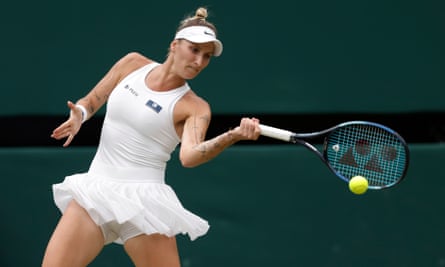There are few better places to catch a glimpse of the next tennis champions than at the Wimbledon qualifying tournament on the grounds of Roehampton’s Bank of England Sports Centre, where many begin to plot their way into the top levels of the sport.
Last year, that was particularly true. A recognisable face among the crowd there was a Czech player by the name Marketa Vondrousova, but she was not in competition. After undergoing a second wrist surgery nearly two months earlier, Vondrousova was in the midst of a six-month layoff. She made her trip from the Czech Republic as a tourist while supporting her best friend and doubles partner, Miriam Kolodziejova, with her wedding imminent.
A year later, she returned to win the whole thing. “We did some sightseeing and some shopping, it was just a normal vacation, but I would have never dreamed of this moment,” she said.
Vondrousova’s victory is a reminder that the pathway of a tennis player is far from direct. She is the first unseeded Wimbledon women’s champion and a player who had previously struggled on grass, so her success may be one of the biggest surprises in recent years. Still, there have always been indications that she had been on the pathway towards achieving big things.
A former junior No 1, Vondrousova was one of the first players of her generation to break into the top 100 and transition on to the main tour. She won her first title at 17, generating ample attention by winning a WTA 250 event in Biel, Switzerland, from qualifying while ranked No 233. Two years later she reached the French Open final at 19.
Vondrousova is 11 days younger than Elena Rybakina, the Wimbledon champion last year, yet there was a time when the Czech was miles ahead during their development. As she faced Ash Barty in the 2019 French Open final, Rybakina had lost in the first round after qualifying for a grand slam tournament for the first time.
Things do not always happen immediately. In Vondrousova’s case, her progress has been affected by the two wrist surgeries, one right after the French Open run. But also by a general lack of conviction and the absence of a winning mentality in matches. Even with the hindsight of Barty subsequently rising to No 1, Vondrousova’s flat performance in that 2019 final was extremely disappointing.

Two years later Vondrousova performed at a spectacular level on the hard courts of Tokyo as she easily defeated Naomi Osaka, on home soil, and Elina Svitolina, who was ranked No 6, en route to the Olympic gold medal match. She had beaten better players than her opponent in the final, Belinda Bencic, and was playing at a higher level. Really, Vondrousova had everything in her power to win the match. She did not have the toughness to see it out.
Between those big results, she has struggled to show those glimpses of excellence consistently. The 24-year-old arrived in the Wimbledon final having won only one WTA title, losing four consecutive finals before her triumph on Saturday. Such was her tendency to vanish in the bigger moments, even people around her were exasperated.
after newsletter promotion
After her victory, Vondrousova recalled a conversation with her mother after losing a doubles final in Berlin this year, her seventh consecutive defeat in a final at WTA level in singles and doubles.
“We played a final in Berlin of doubles,” she said. “My mom was there watching. She was so upset. She told me: ‘I don’t want [you] to be second all the time.’ I was like: ‘OK, Mom, we’ll try today.’”
One interesting detail in Vondrousova’s story is that she won Wimbledon without a clothing sponsor. She had a deal with Nike until last year, when the company chose not to renew her contract, an event that helped to spur her on. “It was a bit sad when it finished but I was like: ‘We’re going to try to find something else, just show them I’m going to be good. I’m going to play good and we’ll see what happens now.’ But I also feel like maybe that’s a good thing that drove me here.”
Now that she has finally arrived here, the definitive question for her career is whether she can consolidate this first great success and perform regularly at a high level to stay there. There is no doubting her game, which presents a refreshing retort to the powerful, first-strike players who have recently risen to the top. With her delicate hands, variety and lefty trickery, driving opponents mad with her drop shots and slice, Vondrousova showed that she can be a nightmare to play against while also possessing enough firepower to battle with bigger hitters. But in a sport where things move on quickly, the challenge of consistently establishing herself among the elite has only just begun.

